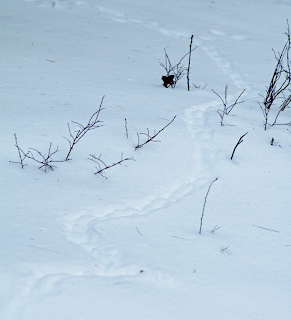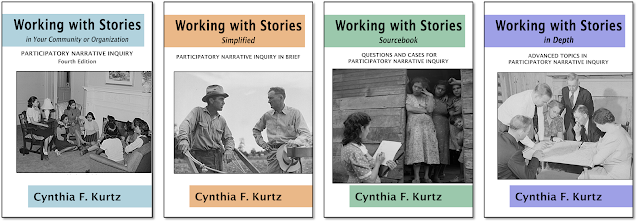Okay, folks, it's time for my biennial "well, that didn't work" blog post.
I have been attempting to make a living as an independent consultant and author for about 22 years. Sometimes my work has brought in an income, and sometimes it hasn't. Granted, for a large portion of that time I was working various amounts of part-time while raising a child. But I got pretty good at using my work time well. (Having two precious hours to get things done before it's time for your toddler to pound on your office door again is wonderfully focusing.)
Another reason for the sometimes-it-hasn't portions is the fact that I'm an open-source zealot. Between books and software, I've given away somewhere between 6 and 8 of those 22 years of work. I chose to do that, and I don't regret any of it. But the rest of the work I have gotten has had to compensate for it. And that hasn't happened, at least not enough.
What happened with the PNI Practicum
The project I have been working on since January of 2022 - designing, building, offering, and running two online practicum courses in participatory narrative inquiry - is now at an end. My third set of PNI Practicum courses has failed to fill up, though I have been advertising them since January of 2023.
Seven people did sign up (the tentative total got as high as 11, but dropped back down later). That's not enough. I've invested a year and a half into this venture, and for it to be financially sustainable going forward, I need to find at least 24 paying students twice a year. Technically there is one more week left before the courses were scheduled to start, and I could wait one more week, but at this point I think it's disrespectful to those who have signed up to keep them waiting. So I'm pulling the plug.
Why didn't the PNI Practicum courses fill up? I've talked to a lot of people about the courses over the past several years, from when I first had the idea in 2015, through designing and developing the courses in early 2022, and through two run-throughs in 2022 and 2023. And I have a much better understanding of the market now than I had before. (That is, now that I'm finished, I'm ready to start.)
Here's what I've learned. There are people who have the money to pay for a $2000 course; and there are people who have the time to take a five-month time-intensive project-based course. They just aren't the same people. The region of overlap in the Venn diagram is minuscule.
This fact alone might not have doomed the venture. After all, I only needed to find 48 paying students a year to make the PNI Practicum a success. I thought that might be possible. But there was another factor: I don't like doing advertising and promotion. Sure, I've been doing it for decades, and not particularly badly. But I have no enthusiasm for it, and it shows, I think. I'd rather spend my time making new stuff than telling people over and over about the stuff I've already made. Anyway, those two factors came together to make it difficult for the courses to scale even such a low bar.
The point of decision
At this point I have two choices. I've been mulling over this decision since the spring, when it became clear that the course was not likely to fill up again.
I could choose to help the people who have the money but not the time to take the course. I could trim down the hours required until busy people could manage to find the time to do it.
I actually spent some time working on this idea. I started to create a "Level 0" course in which students would contribute only a few stories to a single group project, which I would manage and facilitate. For the most part, students would only have to show up to the meetings and watch things happen.
It took me about a week to abandon the effort. It left a sour taste in my mouth. Yes, I probably could make an income helping people pretend they know how to do PNI because they listened to a few lectures and participated in a few interactive workshops. But it would be a lie. You can't learn how to do PNI without doing PNI. Such a course would be like teaching someone to ride a bicycle by having them ride behind you on one. I would basically have a job as a Dunning-Kruger machine operator.
I loved helping people do real projects in the PNI Practicum courses I ran, just as I loved coaching people through their first real projects before that. It was so exciting and motivating to hear people tell me that they went out into their communities and organizations and gathered real stories and ran real sensemaking workshops. I cherished the chance to help people learn from their mistakes and epiphanies. I loved seeing them get excited about what they could do next with PNI, now that they knew how to use it. I don't think I could stand to run a course where that didn't happen.
My second option is to help the people who have the time but not the money to take the course. This is the option I have chosen. I will no longer be offering the PNI Practicum as a paid service.
A silver lining
Even though this business venture didn't work out, I'm still glad I did it, because it produced two useful outcomes for the world.
First, the PNI Practicum can still be useful to people even if I'm not running it. Over the next few to several weeks, I plan to convert the
course materials and instructions into self-running versions of the
two courses. Groups of people will be able to take each course together.
They will follow the course schedule, read and discuss the
readings, carry out the project activities, report in on their projects, get feedback on their ideas, and
work their way through the interactive sessions using the instructions I
originally wrote for myself (which I will rewrite; that's why it is going to take a little while).
The second good thing is that working on the PNI Practicum courses jump-started the fourth edition of Working with Stories. I spent most of 2022 writing the first draft of a picture-book version of WWS (Working with Stories Simplified), plus a set of starter story forms (which will be the WWS Sourcebook). I plan to finish all four books when I can, even if it takes a long time. It took me six years to finish the third edition of WWS. If that happens again, I can live with it. As before, I will release interim versions as I go.
Thank you
I would like to express my deep gratitude to everyone who helped me to create the PNI Practicum courses, from way back when I first started to think about what they might be like, to when I was developing the course structure and materials and web site, to when I was running the courses for the first and second times. You know who you are, my friends. Thank you for your help.
What happens next
My next big project is to look for a real job, with real paychecks and real benefits.
Since I left graduate school 32 years ago, I have worked for exactly one year as a salaried employee. All of the rest of my work has been temporary, most often as an independent contractor. I didn't do that on purpose; it just happened that way. Now I would like to come in from the cold and see if I can find a job with more stability. If I can do that while still working on PNI, that would be wonderful. If not, PNI will slide down into a hobby. That's okay too. I've been doing this work for 24 years now, and it's time to let a new generation pick it up and run with it.
And people are picking up PNI. From what I am hearing, the number of people using it has continued to grow and grow. For a long time I felt that I could not stop working on PNI because it would die without my support. I don't feel like that anymore.
Sure, PNI will change as I let it slip away from me. But I always wanted that to happen. I never wanted to own it. I wanted to be part of a community. And it's happening. A community is forming. In fact, fading into the background might be the best thing I can do for PNI right now. Still, it can't hurt to at least find out whether I can continue to support PNI while making a stable living.
My dream job
The way I have always looked for jobs is to start by looking for my dream job. When that fails, I look for a job that is acceptable. When that fails, I look for a job I can tolerate. I always hope to stop at the first level, but I know I have to be ready to drop down to the third level, and sometimes beyond it. That is the way the world works.
So, what does my dream job look like?
- In my dream job I work on PNI projects, one after another, small and large, short-term and long-term, for some entity. The participants in the projects are citizens or community members or customers or employees or patients or teachers or students (or similar groups), either of my employer or of clients or beneficiaries (or employees or citizens or students) of my employer.
- My dream job sponsors my open-source work by allowing me (and paying me) to spend 4 hours a week finishing my rewrite of the Working with Stories
book series and 4 hours a week maintaining and improving NarraFirma.
Since my employer benefits from this work (along with everyone else) they see this as a mutually beneficial arrangement. They are proud
to sponsor the work, and they are happy to be known as its sponsor.
- My
dream job does not require me to stop speaking in my own voice. I am
allowed to write and build useful things for the world in my spare time.
What I do and say during my work hours (except for the open-source sponsorship
hours) belongs to my employer. What I do and say during my spare time
belongs to me.
- In my dream job I am granted the unchallenged right to opt out of
working on any project I find to be ethically objectionable.
(For example, I will not work on projects that lie to or disrespect participants.) I am always willing to listen and to
negotiate, but I have the last word on whether I will do each project. I am also always willing to help my employer find someone else who can do
any project I cannot do.
- In my dream job I train people in how to do PNI - by doing PNI - as needed. I am also willing to give talks and create bespoke instructional materials, but I am never asked to tell people that they know how to do PNI without ever having done it.
- In my dream job I work with or in some kind of team. In our team we work out how best to support each other as we merge our various strengths and compensate for our various weaknesses.
- In my dream job I work at home. (I've been working at home for about 25 of the past 30 years, and I do my best work there. Also, I live in the middle of nowhere and would like to stay there.) My work hours are flexible. (I get up late.) I travel at most a few times a year. (Allergies.)
What's an acceptable job? One that uses my skills well, treats me with respect, and gives me useful things to do. I'm good at explanatory and technical writing, teaching, coaching, facilitation, project management, qualitative and/or quantitative research, prototyping, software design, user interface design, testing, technical support, and just plain programming. I have BS and MA degrees in biology. I have no degree in the field I've been working in for the past 24 years, but I have wide and deep experience in it. I'm a responsible worker, I know what I'm doing, and I know how to admit it when I don't. I am self-propelled and excel at independent work, but I am also a good collaborator.
If your organization would like to offer me a job, whether it's at my dream or acceptable level, drop me a note.





